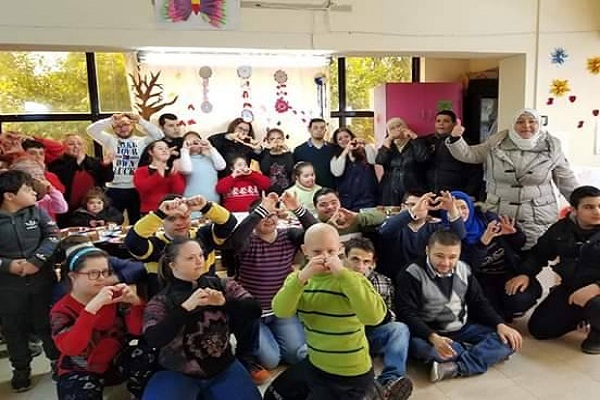LATTAKIA, (ST) – Better understanding of Down syndrome and autism and early intervention can greatly increase the quality of life for children and adults with this disorder and help them live fulfilling lives.
Civil society associations, which are specialized in taking care of children with autism and Down syndrome in different Syrian provinces, are working hard on ground to be a key partner of the Syrian government as to actively integrate these children into society and meet their special needs.
“Bashaer Al-Nour” civil society in Lattakia province is one of the different non government organizations working in Syria to provide vital therapeutic and psychological services to children with autism and Down syndrome. It was established in 2006 with the approval of Labor and Social Affairs Ministry as a non-profit civil society.
“We consider that each person with Down syndrome or autism as a unique individual. Intellectual and developmental disorder may be mild, moderate or severe, some of them are healthy while others have significant health problems”, Mrs. Amineh Mathboot, Head of the society, told Syriatimes e-newspaper.
 She said “the society’s main objectives are providing philanthropy and psychological services to improve the lives of children with autism and Down syndrome through building knowledge and awareness as well as through defending their rights and enhancing the fight against the discrimination they are subjected to.”
She said “the society’s main objectives are providing philanthropy and psychological services to improve the lives of children with autism and Down syndrome through building knowledge and awareness as well as through defending their rights and enhancing the fight against the discrimination they are subjected to.”
According to Mrs. Mathboot, “Bashaer Al-Nour” is also keen on offering different types of care such as the autism special educational programs of all levels, health and social assistance as well as entertainment activities including sport, music and drawing. It also provinces assistance for kids with pronunciation difficulties as well as personalized medical treatment that addresses each of children separately targeting brain activation.
She said that the 54 persons aged between 4 and 20 years at the society are supervised by specialists and trainers qualified enough to provide care for children with autism and Down syndrome, pointing out that most of specialists’ efforts are voluntary.
Mrs. Mathboot underscored that a vocational qualification department was established at the society in 2011 aiming at training adults to learn suitable skills and handicrafts, including sewing, embroidery, crochet, wool to help integrate them into society. She affirmed that the vocational qualification department plays a key role in enhancing the adults’ presence in society and preparing them for real work and community participation.
Mrs. Mathboot highlighted the fact that the kids’ special needs weren’t a barrier preventing them from participating successfully in different kinds of local, Arab and world activities including exhibitions, charity bazaars, competitions and sport Olympiad.
 On her part, Wadea Kakaa, a founder of “Bashaer Al-Nour ” and member of the society’s board of directors, said in a statement to syriatimes that “due to my own experience and the hard circumstances I have faced with my son Hassan Arabi Katbi, who has Down syndrome, I contributed effectively to establish the society”. She made it clear that she had gone to France and carried out training courses on the best ways of dealing with children with Down syndrome .
On her part, Wadea Kakaa, a founder of “Bashaer Al-Nour ” and member of the society’s board of directors, said in a statement to syriatimes that “due to my own experience and the hard circumstances I have faced with my son Hassan Arabi Katbi, who has Down syndrome, I contributed effectively to establish the society”. She made it clear that she had gone to France and carried out training courses on the best ways of dealing with children with Down syndrome .
Mrs. Kakaa stressed “we need to know much more about these children and provide as much effective help as we can as early as possible”.
She expressed pride in her 23 years old son, because despite Down syndrome he managed to be distinctive in society and he is considered very talented, indicating that he is able to depend on himself in everything, including reading, writing and playing the piano, and that he has a job and has his own income.
Mrs. Kakaa called for cooperation between supervisors in the society and children’s families, highlighting in this connection that the society always holds meetings with the families to raise their awareness about dealing with their children to change the people’s view towards children with special needs from sympathy to admiration over their will and skills through which they have defied their disability.
Interviewed by : Rawaa Ghanam

